外研版(2019)选择性必修 第三册Unit 6 Nature in words Using language Grammar 课件(共20张PPT)
文档属性
| 名称 | 外研版(2019)选择性必修 第三册Unit 6 Nature in words Using language Grammar 课件(共20张PPT) |
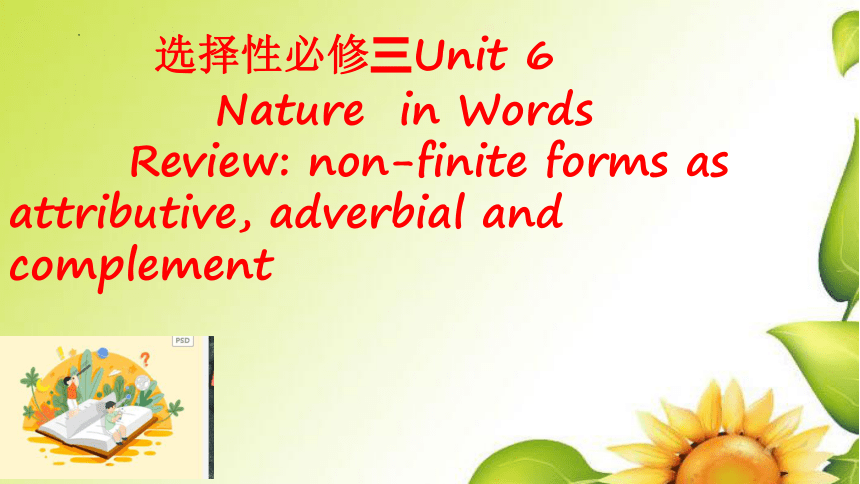
|
|
| 格式 | pptx | ||
| 文件大小 | 1.0MB | ||
| 资源类型 | 教案 | ||
| 版本资源 | 外研版(2019) | ||
| 科目 | 英语 | ||
| 更新时间 | 2024-04-09 00:00:00 | ||
图片预览

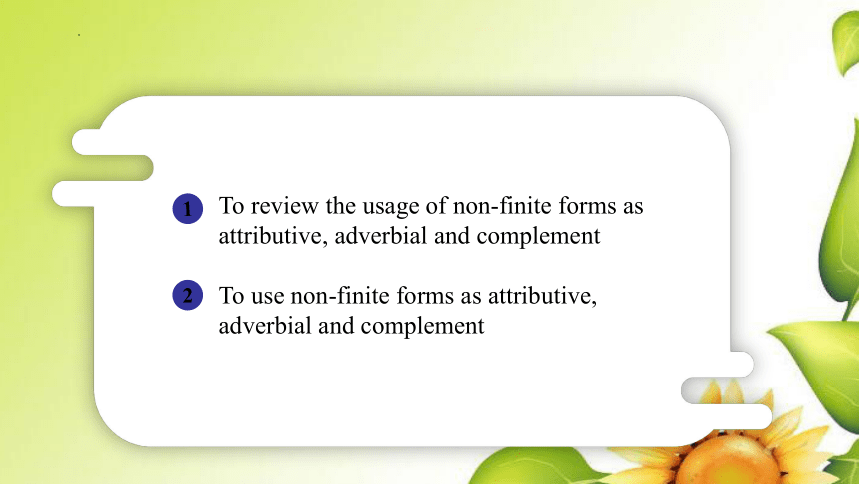
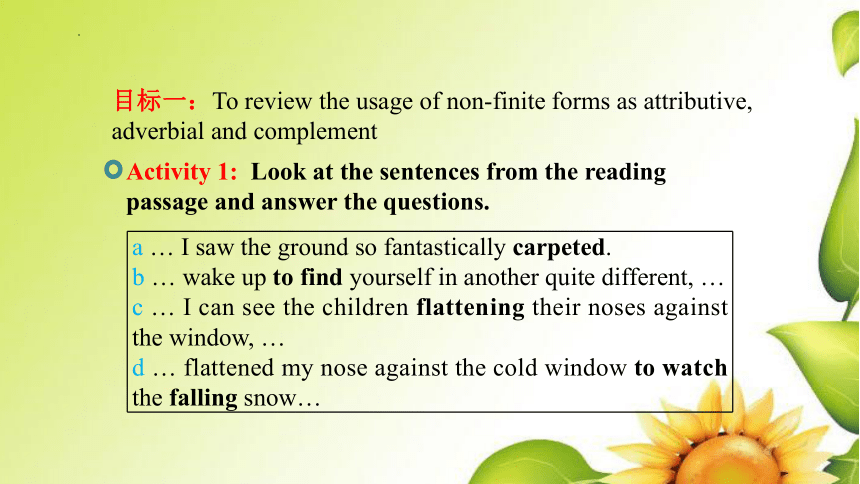
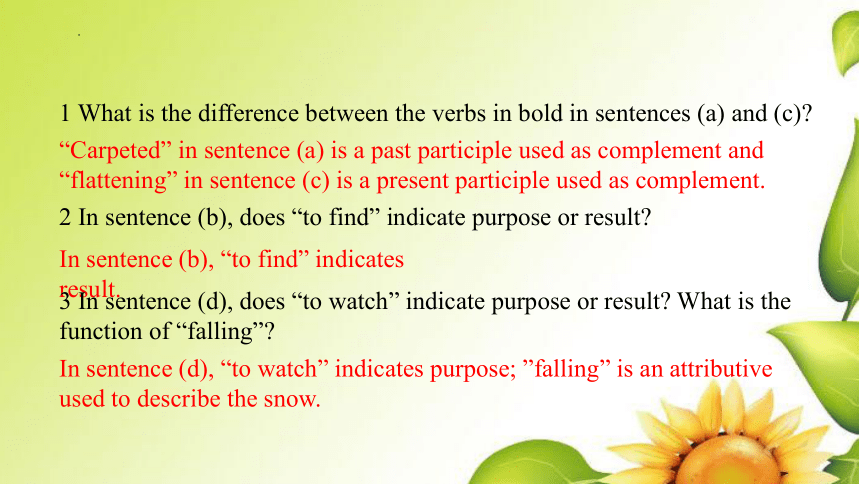
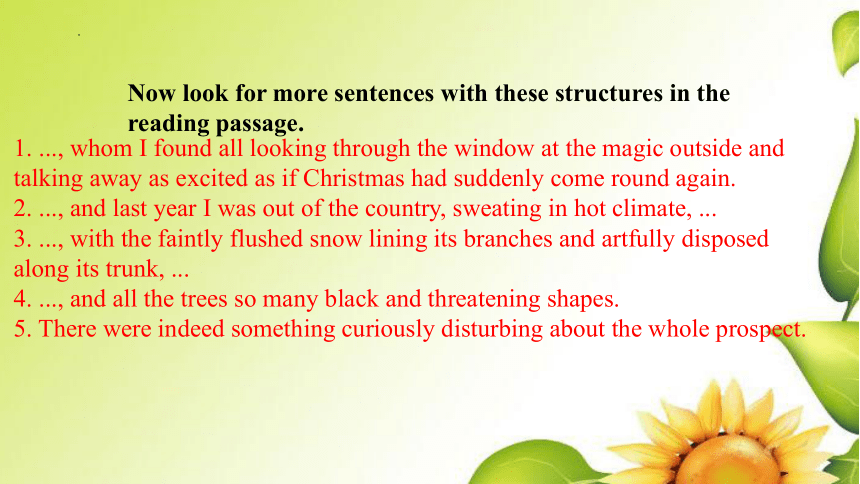
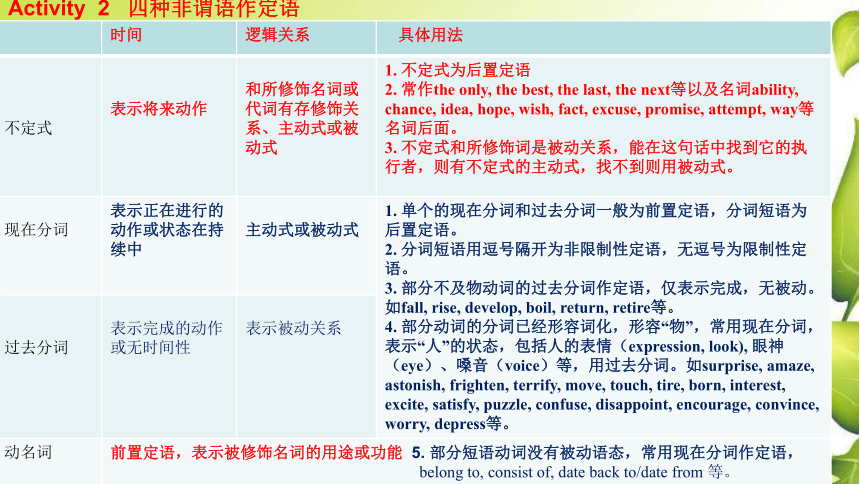
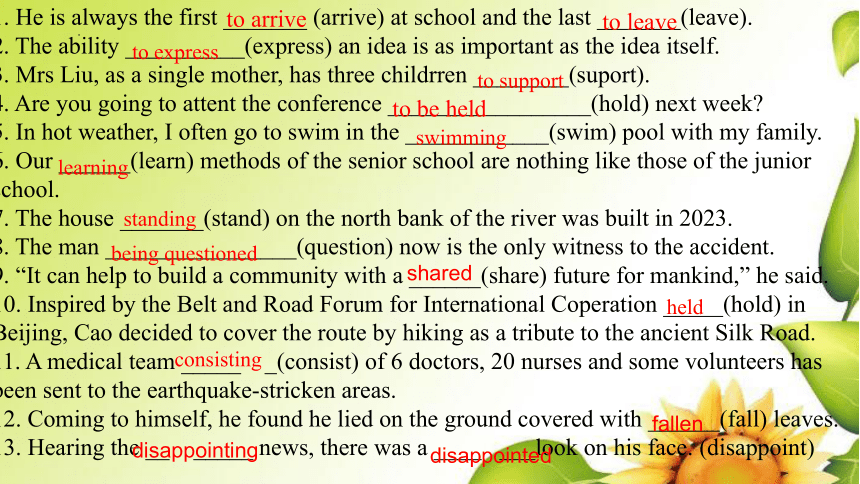
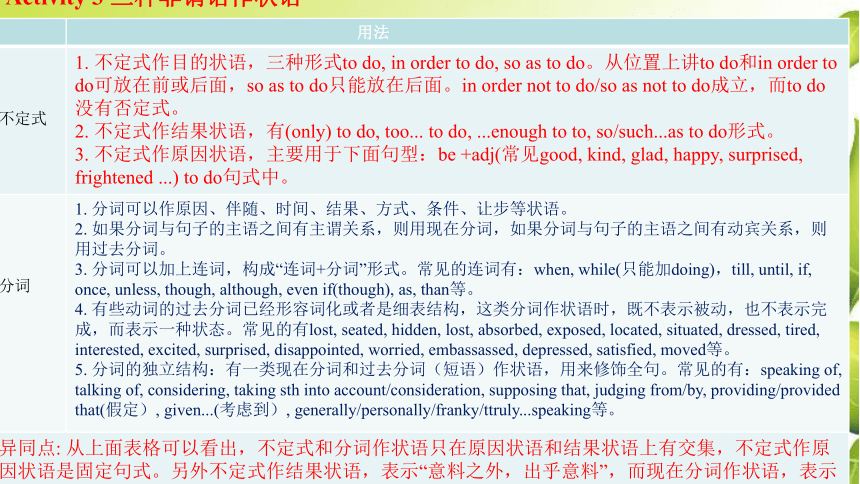
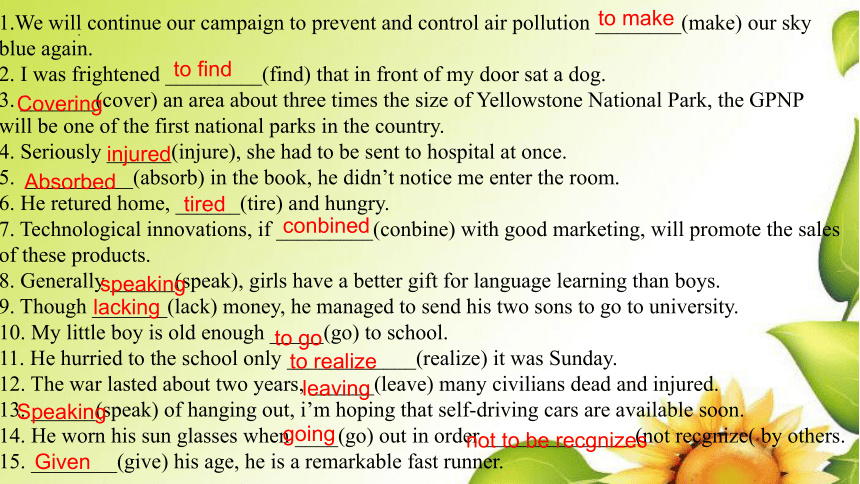
文档简介
(共20张PPT)
选择性必修三Unit 6
Nature in Words
Review: non-finite forms as attributive, adverbial and complement
1
2
To review the usage of non-finite forms as attributive, adverbial and complement
To use non-finite forms as attributive, adverbial and complement
目标一:To review the usage of non-finite forms as attributive, adverbial and complement
Activity 1: Look at the sentences from the reading passage and answer the questions.
a … I saw the ground so fantastically carpeted.
b … wake up to find yourself in another quite different, …
c … I can see the children flattening their noses against the window, …
d … flattened my nose against the cold window to watch the falling snow…
1 What is the difference between the verbs in bold in sentences (a) and (c)
“Carpeted” in sentence (a) is a past participle used as complement and “flattening” in sentence (c) is a present participle used as complement.
2 In sentence (b), does “to find” indicate purpose or result
In sentence (b), “to find” indicates result.
3 In sentence (d), does “to watch” indicate purpose or result What is the function of “falling”
In sentence (d), “to watch” indicates purpose; ”falling” is an attributive used to describe the snow.
Now look for more sentences with these structures in the reading passage.
1. ..., whom I found all looking through the window at the magic outside and talking away as excited as if Christmas had suddenly come round again.
2. ..., and last year I was out of the country, sweating in hot climate, ...
3. ..., with the faintly flushed snow lining its branches and artfully disposed along its trunk, ...
4. ..., and all the trees so many black and threatening shapes.
5. There were indeed something curiously disturbing about the whole prospect.
时间 逻辑关系 具体用法
不定式 表示将来动作 和所修饰名词或代词有存修饰关系、主动式或被动式 1. 不定式为后置定语
2. 常作the only, the best, the last, the next等以及名词ability, chance, idea, hope, wish, fact, excuse, promise, attempt, way等名词后面。
3. 不定式和所修饰词是被动关系,能在这句话中找到它的执行者,则有不定式的主动式,找不到则用被动式。
现在分词 表示正在进行的动作或状态在持续中 主动式或被动式 1. 单个的现在分词和过去分词一般为前置定语,分词短语为后置定语。
2. 分词短语用逗号隔开为非限制性定语,无逗号为限制性定语。
3. 部分不及物动词的过去分词作定语,仅表示完成,无被动。如fall, rise, develop, boil, return, retire等。
4. 部分动词的分词已经形容词化,形容“物”,常用现在分词,表示“人”的状态,包括人的表情(expression, look), 眼神(eye)、嗓音(voice)等,用过去分词。如surprise, amaze, astonish, frighten, terrify, move, touch, tire, born, interest, excite, satisfy, puzzle, confuse, disappoint, encourage, convince, worry, depress等。
过去分词 表示完成的动作或无时间性 表示被动关系
动名词 前置定语,表示被修饰名词的用途或功能 5. 部分短语动词没有被动语态,常用现在分词作定语, belong to, consist of, date back to/date from 等。
Activity 2 四种非谓语作定语
1. He is always the first _______ (arrive) at school and the last _______(leave).
2. The ability __________(express) an idea is as important as the idea itself.
3. Mrs Liu, as a single mother, has three childrren ________(suport).
4. Are you going to attent the conference _________________(hold) next week
5. In hot weather, I often go to swim in the ____________(swim) pool with my family.
6. Our ______(learn) methods of the senior school are nothing like those of the junior school.
7. The house _______(stand) on the north bank of the river was built in 2023.
8. The man ________________(question) now is the only witness to the accident.
9. “It can help to build a community with a ______(share) future for mankind,” he said.
10. Inspired by the Belt and Road Forum for International Coperation _____(hold) in Beijing, Cao decided to cover the route by hiking as a tribute to the ancient Silk Road.
11. A medical team _____ _(consist) of 6 doctors, 20 nurses and some volunteers has been sent to the earthquake-stricken areas.
12. Coming to himself, he found he lied on the ground covered with ______(fall) leaves.
13. Hearing the __ _____ news, there was a ____ ___look on his face. (disappoint)
to arrive
to leave
to express
to support
to be held
swimming
learning
standing
being questioned
shared
held
consisting
fallen
disappointing
disappointed
Activity 3 三种非谓语作状语
用法
不定式 1. 不定式作目的状语,三种形式to do, in order to do, so as to do。从位置上讲to do和in order to do可放在前或后面,so as to do只能放在后面。in order not to do/so as not to do成立,而to do没有否定式。
2. 不定式作结果状语,有(only) to do, too... to do, ...enough to to, so/such...as to do形式。
3. 不定式作原因状语,主要用于下面句型:be +adj(常见good, kind, glad, happy, surprised, frightened ...) to do句式中。
分词 1. 分词可以作原因、伴随、时间、结果、方式、条件、让步等状语。
2. 如果分词与句子的主语之间有主谓关系,则用现在分词,如果分词与句子的主语之间有动宾关系,则用过去分词。
3. 分词可以加上连词,构成“连词+分词”形式。常见的连词有:when, while(只能加doing),till, until, if, once, unless, though, although, even if(though), as, than等。
4. 有些动词的过去分词已经形容词化或者是细表结构,这类分词作状语时,既不表示被动,也不表示完成,而表示一种状态。常见的有lost, seated, hidden, lost, absorbed, exposed, located, situated, dressed, tired, interested, excited, surprised, disappointed, worried, embassassed, depressed, satisfied, moved等。
5. 分词的独立结构:有一类现在分词和过去分词(短语)作状语,用来修饰全句。常见的有:speaking of, talking of, considering, taking sth into account/consideration, supposing that, judging from/by, providing/provided that(假定), given...(考虑到), generally/personally/franky/ttruly...speaking等。
异同点: 从上面表格可以看出,不定式和分词作状语只在原因状语和结果状语上有交集,不定式作原因状语是固定句式。另外不定式作结果状语,表示“意料之外,出乎意料”,而现在分词作状语,表示“意料之内,自然而然”。
1.We will continue our campaign to prevent and control air pollution ________(make) our sky blue again.
2. I was frightened _________(find) that in front of my door sat a dog.
3. _______(cover) an area about three times the size of Yellowstone National Park, the GPNP will be one of the first national parks in the country.
4. Seriously ______(injure), she had to be sent to hospital at once.
5. __________(absorb) in the book, he didn’t notice me enter the room.
6. He retured home, ______(tire) and hungry.
7. Technological innovations, if _________(conbine) with good marketing, will promote the sales of these products.
8. Generally ______(speak), girls have a better gift for language learning than boys.
9. Though _______(lack) money, he managed to send his two sons to go to university.
10. My little boy is old enough _____(go) to school.
11. He hurried to the school only ____________(realize) it was Sunday.
12. The war lasted about two years, ______(leave) many civilians dead and injured.
13. ______(speak) of hanging out, i’m hoping that self-driving cars are available soon.
14. He worn his sun glasses when ____(go) out in order ______________(not recgnize( by others.
15. ________(give) his age, he is a remarkable fast runner.
to make
to find
Covering
injured
Absorbed
tired
conbined
speaking
lacking
to go
to realize
leaving
Speaking
going
not to be recgnizes
Given
Activity 4 三种非谓语作补语
用法
不定式 1. 很多表示“指示、愿望、感觉”类动词(短语)后用不定式做宾补,构成”V +sb./sth.+to do”结构,常见用ask, hate, like, want, invite, force, expect, allow, permit, persuade, order, warn, remind, forbid, encourage, advise, teach, prefer, cause等。
2. 在感官类动词后面,表示动作的全过程,且在一下动词后面,常省略”to”,变成被动句,还原“to”。常见动词:一感(feel),二听(hear, listen to),五看(see, notice, observe, watch, look at)。
3. 在使役动词后,表示一次性具体动作,常见用have, get, make, let, leave等。
分词 1. 在感官类动词(包括catch, spot等)后面,表示动作正在进行或状态在持续,和宾语为主谓关系,用现在分词。和宾语是动宾关系是过去分词。
2. 在使役动词后(have, make, let, get, leave, keep, set, start等),表示动作正在进行或状态在持续,和宾语为主谓关系,用现在分词。和宾语是动宾关系是过去分词。
3. 某些分词形容词化的动词,在感官动词和使役动词后,宾语是人,常用过去分词作宾补,宾语是物,常用现在分词作宾补。常见有:surprise, amaze, astonish, frighten, terrify, move, touch, tire, born, interest, excite, satisfy, puzzle, confuse, disappoint, encourage, convince, worry, depress等。
特殊用法:1. make后面的宾补没有现在分词;2. set后的宾补没有过去分词;3. get/leave后的不定式宾补,不能省略to。
1. Father will not allow us _________(play) in the street.
2. The little boy was seen __________(fall) from a high tree.
3. At last, I noticed him ______(come) out of the room, _____(lock) the door and _____(run) away.
4. We accessed the wall through the South Gate. The wall is 12 meters high and from here you can see streams of people ______(move) inside and outside the City Wall.
5. Our teacher had us all ______(redo) our homework after class.
6. But that’s how nature is --- always leaving us ________(astonish).
7. I need a new passport so i will have to have my phototgraph _______(take).
8. The teacher got some students ________(stay) in the classroom for practice of performance.
9. At the party, the pretty girl wore a very attractive skirt to make herself ________(notice).
10. Tom was caught _______(sleep) in class, which made his teacher angry.
11. My parents words set me ________(think) deeply.
12. He added some details to the novel to make it more __________(interest).
to play
to fall
come
lock
run
moving
redo
astonished
taken
to stay
noticed
sleeping
thinking
interesting
目标二: To use non-finite forms as attributive, adverbial and complement
Activity 1: Complete the passage with the correct form of the verbs in brackets.
The Lake Poets were a small group of poets 1____________ (live) in the Lake District of England in the late 18th and early 19th centuries. The Lake District,2____________ (know) for its beauty, is in the north-west of England. The first of the poets 3____________ (come) there was Robert Southey, one of the most 4____________ (respect) poets of his time. He was followed by William Wordsworth, perhaps Britain’s most 5____________ (celebrate) 19th century poet, and then Samuel Coleridge, who had written the 6____________ (pioneer) work Lyrical Ballads with Wordsworth. Soon, 7____________ (draw) both by its natural beauty and a desire to be near these famous poets, other poets came 8____________ (live) in the Lake District. All of these poets were seen as part of the Romantic Movement.
living
known
to come/coming
respected
celebrated
pioneering
draw
to live
Activity 2: Look at the picture and complete the travel journal entry with the words in the box. Use the structures you have learnt in this unit where appropriate.
find blow go see
fall relax enjoy run
Today, whilst walking along a peaceful river running through a university campus, I was amazed to find..._______________________________________________________________________________________________________________________________________________________________________________________________________________________________________
Today, whilst walking along a peaceful river running through a university campus, I was amazed to find a young couple enjoying the beautiful scenery and relaxing there. There are falling leaves going away with the running water. Some leaves are blowing away from the tree trunk. I’m eager to see the coming harvest season - Fall.
Sample
Activity 3: Work in pairs. Talk about a travel experience of your own that brought you closer to nature, using the structures you have learnt in this unit where appropriate.
I went to take a walk with my sons in the near national park in our city. There we saw many birds flying from tree to tree. My two little sons were running after butterflies happily. You can see people having picnics there.
Practise
一、单句语法填空
1. _____(strengthen) the connection with young people, the event included a numbr of public promotional activities on social media, _____(invite) 29 tea professionals from around the world to have 36 hours of uninterrupted live broadcast.
2. He flew 4,7000 kilometers from Xi’an to Kashgar on Sep.20, _____(plan) to hike back to Xi’an in five months.
3. ______(attract) by te beauty of nature, the girl from London decided to spend another two days on the farm.
4. Sarah, hurry up. I’m afraid you won’t have time _____(get) changed before the party.
5. The goods _____(buy) from the Internet are cheaper than those we buy in shops.
6. Hee lefte home early only _____(find) he was late as he went a wrong way.
7. Come to see me whenever you need help. I will be more than pleased _____(help) you.
8. I could feel the wind _____(blow) on my face through an open window.
9. As he knows very little English, he finds it to make himself difficult _____(understand).
10. The managers discussed the plan that they would likee to see _____(carry) out the next year.
11. A visually-challenged man from Beijing recently hiked 40 days to Xi’an, as a first step ____(journey) the Belt and Road route by foot.
12. ___(face)with so much trouble, we failed to completed the task no time.
13. In the dream Peter saw himself ___(chase) by a fierce wolf, and he woke suddenly with a start.
14. _____(take) everything into consideration, you are a qualified applicant.
15. If ____(heat), the metal will expand.
二、语篇语法填空
The truth that trees are vital to our life is not a secret. Besides 1. ____(provide) us with food, wood and most importantly, oxygen, they have one more thing ---blocking out harmful bacteria from water.
The discovery was made by a team 2. ____(consist) of scientists from the Massachusetts Institute of Technology (MIT) and high school students who were seeking a natural water filter—one that would help communities in 3. ____(develop) countries that do not have access to modern water filter system.
The researchers, led by Professor Rohit Karnik, decided 4. ____(turn) to trees for help because they could allow liquid 5 ____(flow) through, while blocking out air bubbles.
They began by 6. ___(cut) 1.5-inch-wide sections of tree bark from the branches of a white pine tree. The people 7. ___(relate) then tested the wood’s filtering ability by pouring water 8. ___(contain) red dye particles of different sizes through. To their amazement, they found that it was effective in trapping all the particles. 9. ___(encourage), the team conducted another experiment, this time with water which contained bacteria. Sure enough, the sapwood held back 99% of the bacteria, 10. ___(allow) only 1% to flow through.
Key
一、
1. To strengthen 2. inviting 3. planning 3. Attracted 4. to get 5. bought
6. to find 7. to help 8. blowing 9. understood 10. caried 11. to journey
12. Faced 13. chased 14. Taking 15. heated
二、
1. providing 2. consisting 3. developing 4. to turn 5. to flow 6. cutting 7. related
8. containing 9. Encouraged 10. allowing
Thank you!
选择性必修三Unit 6
Nature in Words
Review: non-finite forms as attributive, adverbial and complement
1
2
To review the usage of non-finite forms as attributive, adverbial and complement
To use non-finite forms as attributive, adverbial and complement
目标一:To review the usage of non-finite forms as attributive, adverbial and complement
Activity 1: Look at the sentences from the reading passage and answer the questions.
a … I saw the ground so fantastically carpeted.
b … wake up to find yourself in another quite different, …
c … I can see the children flattening their noses against the window, …
d … flattened my nose against the cold window to watch the falling snow…
1 What is the difference between the verbs in bold in sentences (a) and (c)
“Carpeted” in sentence (a) is a past participle used as complement and “flattening” in sentence (c) is a present participle used as complement.
2 In sentence (b), does “to find” indicate purpose or result
In sentence (b), “to find” indicates result.
3 In sentence (d), does “to watch” indicate purpose or result What is the function of “falling”
In sentence (d), “to watch” indicates purpose; ”falling” is an attributive used to describe the snow.
Now look for more sentences with these structures in the reading passage.
1. ..., whom I found all looking through the window at the magic outside and talking away as excited as if Christmas had suddenly come round again.
2. ..., and last year I was out of the country, sweating in hot climate, ...
3. ..., with the faintly flushed snow lining its branches and artfully disposed along its trunk, ...
4. ..., and all the trees so many black and threatening shapes.
5. There were indeed something curiously disturbing about the whole prospect.
时间 逻辑关系 具体用法
不定式 表示将来动作 和所修饰名词或代词有存修饰关系、主动式或被动式 1. 不定式为后置定语
2. 常作the only, the best, the last, the next等以及名词ability, chance, idea, hope, wish, fact, excuse, promise, attempt, way等名词后面。
3. 不定式和所修饰词是被动关系,能在这句话中找到它的执行者,则有不定式的主动式,找不到则用被动式。
现在分词 表示正在进行的动作或状态在持续中 主动式或被动式 1. 单个的现在分词和过去分词一般为前置定语,分词短语为后置定语。
2. 分词短语用逗号隔开为非限制性定语,无逗号为限制性定语。
3. 部分不及物动词的过去分词作定语,仅表示完成,无被动。如fall, rise, develop, boil, return, retire等。
4. 部分动词的分词已经形容词化,形容“物”,常用现在分词,表示“人”的状态,包括人的表情(expression, look), 眼神(eye)、嗓音(voice)等,用过去分词。如surprise, amaze, astonish, frighten, terrify, move, touch, tire, born, interest, excite, satisfy, puzzle, confuse, disappoint, encourage, convince, worry, depress等。
过去分词 表示完成的动作或无时间性 表示被动关系
动名词 前置定语,表示被修饰名词的用途或功能 5. 部分短语动词没有被动语态,常用现在分词作定语, belong to, consist of, date back to/date from 等。
Activity 2 四种非谓语作定语
1. He is always the first _______ (arrive) at school and the last _______(leave).
2. The ability __________(express) an idea is as important as the idea itself.
3. Mrs Liu, as a single mother, has three childrren ________(suport).
4. Are you going to attent the conference _________________(hold) next week
5. In hot weather, I often go to swim in the ____________(swim) pool with my family.
6. Our ______(learn) methods of the senior school are nothing like those of the junior school.
7. The house _______(stand) on the north bank of the river was built in 2023.
8. The man ________________(question) now is the only witness to the accident.
9. “It can help to build a community with a ______(share) future for mankind,” he said.
10. Inspired by the Belt and Road Forum for International Coperation _____(hold) in Beijing, Cao decided to cover the route by hiking as a tribute to the ancient Silk Road.
11. A medical team _____ _(consist) of 6 doctors, 20 nurses and some volunteers has been sent to the earthquake-stricken areas.
12. Coming to himself, he found he lied on the ground covered with ______(fall) leaves.
13. Hearing the __ _____ news, there was a ____ ___look on his face. (disappoint)
to arrive
to leave
to express
to support
to be held
swimming
learning
standing
being questioned
shared
held
consisting
fallen
disappointing
disappointed
Activity 3 三种非谓语作状语
用法
不定式 1. 不定式作目的状语,三种形式to do, in order to do, so as to do。从位置上讲to do和in order to do可放在前或后面,so as to do只能放在后面。in order not to do/so as not to do成立,而to do没有否定式。
2. 不定式作结果状语,有(only) to do, too... to do, ...enough to to, so/such...as to do形式。
3. 不定式作原因状语,主要用于下面句型:be +adj(常见good, kind, glad, happy, surprised, frightened ...) to do句式中。
分词 1. 分词可以作原因、伴随、时间、结果、方式、条件、让步等状语。
2. 如果分词与句子的主语之间有主谓关系,则用现在分词,如果分词与句子的主语之间有动宾关系,则用过去分词。
3. 分词可以加上连词,构成“连词+分词”形式。常见的连词有:when, while(只能加doing),till, until, if, once, unless, though, although, even if(though), as, than等。
4. 有些动词的过去分词已经形容词化或者是细表结构,这类分词作状语时,既不表示被动,也不表示完成,而表示一种状态。常见的有lost, seated, hidden, lost, absorbed, exposed, located, situated, dressed, tired, interested, excited, surprised, disappointed, worried, embassassed, depressed, satisfied, moved等。
5. 分词的独立结构:有一类现在分词和过去分词(短语)作状语,用来修饰全句。常见的有:speaking of, talking of, considering, taking sth into account/consideration, supposing that, judging from/by, providing/provided that(假定), given...(考虑到), generally/personally/franky/ttruly...speaking等。
异同点: 从上面表格可以看出,不定式和分词作状语只在原因状语和结果状语上有交集,不定式作原因状语是固定句式。另外不定式作结果状语,表示“意料之外,出乎意料”,而现在分词作状语,表示“意料之内,自然而然”。
1.We will continue our campaign to prevent and control air pollution ________(make) our sky blue again.
2. I was frightened _________(find) that in front of my door sat a dog.
3. _______(cover) an area about three times the size of Yellowstone National Park, the GPNP will be one of the first national parks in the country.
4. Seriously ______(injure), she had to be sent to hospital at once.
5. __________(absorb) in the book, he didn’t notice me enter the room.
6. He retured home, ______(tire) and hungry.
7. Technological innovations, if _________(conbine) with good marketing, will promote the sales of these products.
8. Generally ______(speak), girls have a better gift for language learning than boys.
9. Though _______(lack) money, he managed to send his two sons to go to university.
10. My little boy is old enough _____(go) to school.
11. He hurried to the school only ____________(realize) it was Sunday.
12. The war lasted about two years, ______(leave) many civilians dead and injured.
13. ______(speak) of hanging out, i’m hoping that self-driving cars are available soon.
14. He worn his sun glasses when ____(go) out in order ______________(not recgnize( by others.
15. ________(give) his age, he is a remarkable fast runner.
to make
to find
Covering
injured
Absorbed
tired
conbined
speaking
lacking
to go
to realize
leaving
Speaking
going
not to be recgnizes
Given
Activity 4 三种非谓语作补语
用法
不定式 1. 很多表示“指示、愿望、感觉”类动词(短语)后用不定式做宾补,构成”V +sb./sth.+to do”结构,常见用ask, hate, like, want, invite, force, expect, allow, permit, persuade, order, warn, remind, forbid, encourage, advise, teach, prefer, cause等。
2. 在感官类动词后面,表示动作的全过程,且在一下动词后面,常省略”to”,变成被动句,还原“to”。常见动词:一感(feel),二听(hear, listen to),五看(see, notice, observe, watch, look at)。
3. 在使役动词后,表示一次性具体动作,常见用have, get, make, let, leave等。
分词 1. 在感官类动词(包括catch, spot等)后面,表示动作正在进行或状态在持续,和宾语为主谓关系,用现在分词。和宾语是动宾关系是过去分词。
2. 在使役动词后(have, make, let, get, leave, keep, set, start等),表示动作正在进行或状态在持续,和宾语为主谓关系,用现在分词。和宾语是动宾关系是过去分词。
3. 某些分词形容词化的动词,在感官动词和使役动词后,宾语是人,常用过去分词作宾补,宾语是物,常用现在分词作宾补。常见有:surprise, amaze, astonish, frighten, terrify, move, touch, tire, born, interest, excite, satisfy, puzzle, confuse, disappoint, encourage, convince, worry, depress等。
特殊用法:1. make后面的宾补没有现在分词;2. set后的宾补没有过去分词;3. get/leave后的不定式宾补,不能省略to。
1. Father will not allow us _________(play) in the street.
2. The little boy was seen __________(fall) from a high tree.
3. At last, I noticed him ______(come) out of the room, _____(lock) the door and _____(run) away.
4. We accessed the wall through the South Gate. The wall is 12 meters high and from here you can see streams of people ______(move) inside and outside the City Wall.
5. Our teacher had us all ______(redo) our homework after class.
6. But that’s how nature is --- always leaving us ________(astonish).
7. I need a new passport so i will have to have my phototgraph _______(take).
8. The teacher got some students ________(stay) in the classroom for practice of performance.
9. At the party, the pretty girl wore a very attractive skirt to make herself ________(notice).
10. Tom was caught _______(sleep) in class, which made his teacher angry.
11. My parents words set me ________(think) deeply.
12. He added some details to the novel to make it more __________(interest).
to play
to fall
come
lock
run
moving
redo
astonished
taken
to stay
noticed
sleeping
thinking
interesting
目标二: To use non-finite forms as attributive, adverbial and complement
Activity 1: Complete the passage with the correct form of the verbs in brackets.
The Lake Poets were a small group of poets 1____________ (live) in the Lake District of England in the late 18th and early 19th centuries. The Lake District,2____________ (know) for its beauty, is in the north-west of England. The first of the poets 3____________ (come) there was Robert Southey, one of the most 4____________ (respect) poets of his time. He was followed by William Wordsworth, perhaps Britain’s most 5____________ (celebrate) 19th century poet, and then Samuel Coleridge, who had written the 6____________ (pioneer) work Lyrical Ballads with Wordsworth. Soon, 7____________ (draw) both by its natural beauty and a desire to be near these famous poets, other poets came 8____________ (live) in the Lake District. All of these poets were seen as part of the Romantic Movement.
living
known
to come/coming
respected
celebrated
pioneering
draw
to live
Activity 2: Look at the picture and complete the travel journal entry with the words in the box. Use the structures you have learnt in this unit where appropriate.
find blow go see
fall relax enjoy run
Today, whilst walking along a peaceful river running through a university campus, I was amazed to find..._______________________________________________________________________________________________________________________________________________________________________________________________________________________________________
Today, whilst walking along a peaceful river running through a university campus, I was amazed to find a young couple enjoying the beautiful scenery and relaxing there. There are falling leaves going away with the running water. Some leaves are blowing away from the tree trunk. I’m eager to see the coming harvest season - Fall.
Sample
Activity 3: Work in pairs. Talk about a travel experience of your own that brought you closer to nature, using the structures you have learnt in this unit where appropriate.
I went to take a walk with my sons in the near national park in our city. There we saw many birds flying from tree to tree. My two little sons were running after butterflies happily. You can see people having picnics there.
Practise
一、单句语法填空
1. _____(strengthen) the connection with young people, the event included a numbr of public promotional activities on social media, _____(invite) 29 tea professionals from around the world to have 36 hours of uninterrupted live broadcast.
2. He flew 4,7000 kilometers from Xi’an to Kashgar on Sep.20, _____(plan) to hike back to Xi’an in five months.
3. ______(attract) by te beauty of nature, the girl from London decided to spend another two days on the farm.
4. Sarah, hurry up. I’m afraid you won’t have time _____(get) changed before the party.
5. The goods _____(buy) from the Internet are cheaper than those we buy in shops.
6. Hee lefte home early only _____(find) he was late as he went a wrong way.
7. Come to see me whenever you need help. I will be more than pleased _____(help) you.
8. I could feel the wind _____(blow) on my face through an open window.
9. As he knows very little English, he finds it to make himself difficult _____(understand).
10. The managers discussed the plan that they would likee to see _____(carry) out the next year.
11. A visually-challenged man from Beijing recently hiked 40 days to Xi’an, as a first step ____(journey) the Belt and Road route by foot.
12. ___(face)with so much trouble, we failed to completed the task no time.
13. In the dream Peter saw himself ___(chase) by a fierce wolf, and he woke suddenly with a start.
14. _____(take) everything into consideration, you are a qualified applicant.
15. If ____(heat), the metal will expand.
二、语篇语法填空
The truth that trees are vital to our life is not a secret. Besides 1. ____(provide) us with food, wood and most importantly, oxygen, they have one more thing ---blocking out harmful bacteria from water.
The discovery was made by a team 2. ____(consist) of scientists from the Massachusetts Institute of Technology (MIT) and high school students who were seeking a natural water filter—one that would help communities in 3. ____(develop) countries that do not have access to modern water filter system.
The researchers, led by Professor Rohit Karnik, decided 4. ____(turn) to trees for help because they could allow liquid 5 ____(flow) through, while blocking out air bubbles.
They began by 6. ___(cut) 1.5-inch-wide sections of tree bark from the branches of a white pine tree. The people 7. ___(relate) then tested the wood’s filtering ability by pouring water 8. ___(contain) red dye particles of different sizes through. To their amazement, they found that it was effective in trapping all the particles. 9. ___(encourage), the team conducted another experiment, this time with water which contained bacteria. Sure enough, the sapwood held back 99% of the bacteria, 10. ___(allow) only 1% to flow through.
Key
一、
1. To strengthen 2. inviting 3. planning 3. Attracted 4. to get 5. bought
6. to find 7. to help 8. blowing 9. understood 10. caried 11. to journey
12. Faced 13. chased 14. Taking 15. heated
二、
1. providing 2. consisting 3. developing 4. to turn 5. to flow 6. cutting 7. related
8. containing 9. Encouraged 10. allowing
Thank you!
